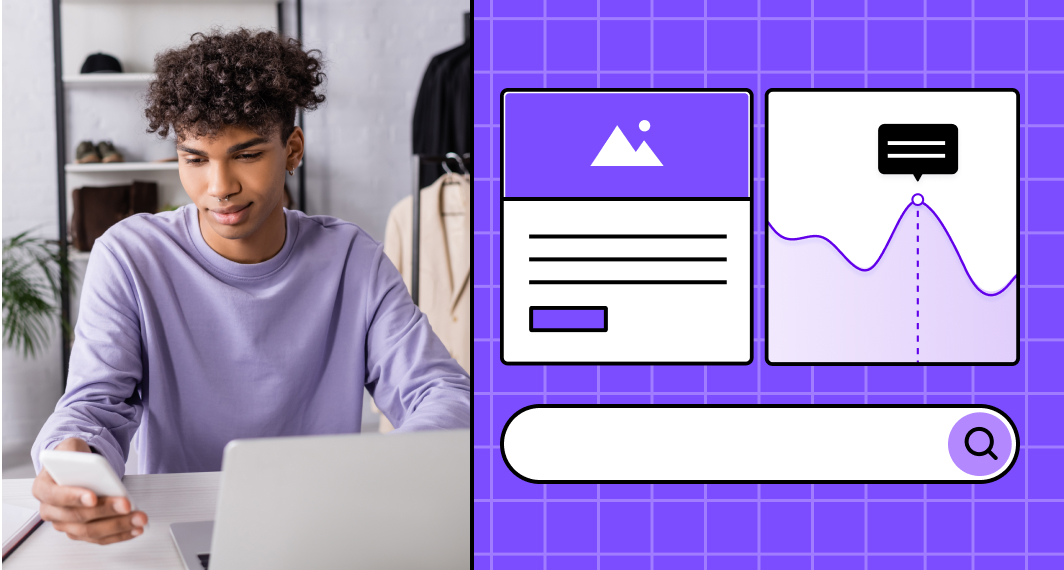What is a hybrid app?
A hybrid app combines elements of both native and web applications, offering a versatile solution. As they’re positioned in between web applications and native applications, they provide a middle-of-the-road approach and have a few distinct advantages.
Hybrid applications enable cross-platform compatibility, allowing you to deploy the same codebase on multiple mobile devices. While hybrid apps may not match the performance of fully native ones, they provide a cost-effective and efficient way to reach a broader audience with a consistent user experience.
How are hybrid apps different from native apps?
Native apps are applications developed specifically for a particular platform, such as iOS or Android. They are optimised for the native hardware and software of the target platform, providing high performance, seamless integration with device features and a consistent user experience.
The key differences between native apps and hybrid apps lie in their development approach, performance and access to native features.
Where native apps use platform-specific app programming languages like Swift or Objective-C for iOS and Kotlin or Java for Android, hybrid apps are made using web technologies like HTML, CSS and JavaScript.
Native apps are generally faster and leverage the full capabilities of the device, but they lack cross-platform capabilities. On the other hand, hybrid apps are a bit slower than native apps but can operate on different operating systems.
Advantages of hybrid apps
There are many benefits to developing hybrid apps over native apps 👇
1 - Cross-platform apps
While native apps have native code and are platform-specific, hybrid apps are designed to run on various platforms, like iOS and Android. This is achieved by using frameworks like React Native or Flutter, allowing you to write source code once and deploy it across different operating systems.
It ensures a broader reach and audience engagement without the need for separate development for each mobile platform.
2 - Cost-effectiveness
Hybrid mobile app development significantly reduces app development costs by sharing a single codebase across platforms. Instead of maintaining separate teams for iOS and Android development, you can streamline resources, save development time and cut down on expenses, making it an efficient solution for businesses with budget constraints.
3 - Offline functionality
Hybrid apps can offer certain features even without an internet connection. By using local storage and caching strategies, your users can access previously loaded content or perform specific tasks offline. This is advantageous in scenarios where a stable internet connection may not always be available.
4 - Faster development
Hybrid mobile apps speed up development processes compared to building separate native apps. The use of web technologies like HTML, CSS and JavaScript, along with frameworks and tools, accelerates the development cycle of your app. This agility is beneficial for your business, as you can aim for a quicker time to market.
5 - Unified user experience
Hybrid applications provide a consistent interface and user experience across different platforms. Users will encounter similar navigation patterns, layouts and design elements, irrespective of whether they are using the app on an iOS or Android device. This uniformity contributes to better user engagement and satisfaction.
6 - Easy updates
A hybrid app development framework simplifies the update process for your app. Since changes can be made to the shared codebase, updates are applied universally across platforms. Your users don't need to download and install new versions manually, enhancing user convenience and ensuring that everyone benefits from the latest features and bug fixes.
7 - Access to mobile device features
Hybrid apps can leverage native mobile device capabilities through plugins. This allows your development teams to access features like the camera, GPS and sensors, enhancing the app's functionality.
Disadvantages of hybrid apps
While hybrid apps have many advantages, they come with their fair share of cons.
1 - Performance issues
Hybrid apps may face performance challenges compared to native apps. The additional layer and the use of web technologies can lead to slower execution of certain functions, especially those requiring complex graphics or high computational power.
This can result in a less responsive user interface and a suboptimal user experience for your app, particularly in graphics-intensive mobile applications.
2 - Limited access to native features
While hybrid apps can access native features through plugins, the level of integration may not match that of native apps. Some advanced or platform-specific functionalities may be challenging to implement seamlessly in your app, impacting the overall user experience. Access to cutting-edge features released by platforms might also be delayed in hybrid development.
3 - Dependency on third-party frameworks
Hybrid mobile app development often relies on third-party frameworks and libraries to bridge the gap between web technologies and native features. This dependency can lead to issues with compatibility, security vulnerabilities and potential challenges in keeping your app up to date with the latest platform updates or security patches.
4 - Limited offline capabilities
While hybrid apps can offer offline functionality to some extent, they may not match the offline capabilities of fully native apps. Your users may face limitations in accessing certain features or content without an internet connection, affecting the app's usability in offline scenarios.
5 - Potential for Slower Updates
Updates to hybrid applications may be subject to delays as they need to go through the app store approval process for each platform. This contrasts with web apps that can be updated instantly. This delay can impact the timely delivery of new features, bug fixes and security patches to your users.
Get a free app prototype now!
Bring your software to life in under 10 mins. Zero commitments.

 Facebook
Facebook X
X LinkedIn
LinkedIn YouTube
YouTube Instagram
Instagram RSS
RSS


